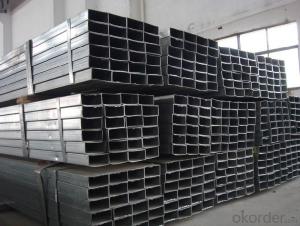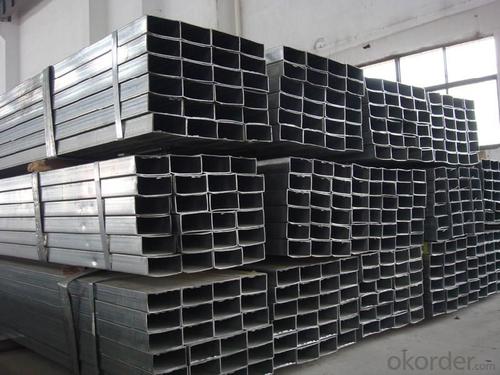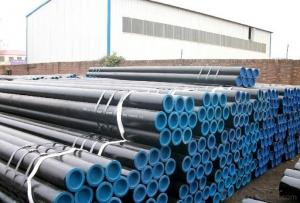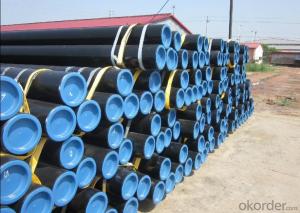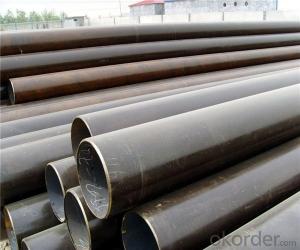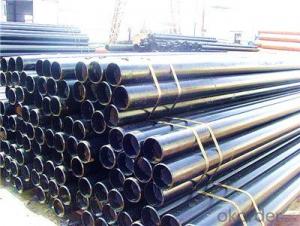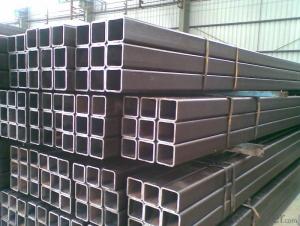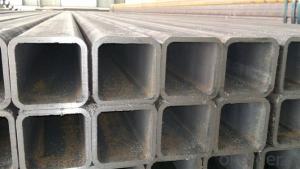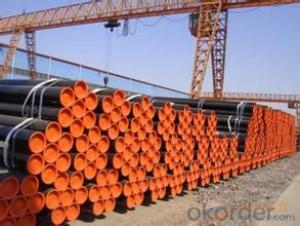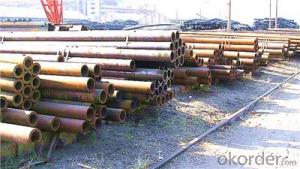Square And Rectangular Steel Pipe All Sizes Good Price
- Loading Port:
- Tianjin
- Payment Terms:
- TT OR LC
- Min Order Qty:
- 25 m
- Supply Capability:
- 10000 m/month
OKorder Service Pledge
OKorder Financial Service
You Might Also Like
1、Structure of Square And Rectangular Steel Pipe All Sizes Good Price:
To be used for construction, furniture structures as well as other fabrication purposes.
2、Main Features of Square And Rectangular Steel Pipe All Sizes Good Price:
• High manufacturing accuracy
• High strength
• Small inertia resistance
• Strong heat dissipation ability
• Good visual effect
• Reasonable price
3、Square And Rectangular Steel Pipe All Sizes Good Price Specification:
Standard | ASTM A500, GB6728 |
Grade | A, B, C, Q195, Q235, Q215 |
Thickness | 0.6-10MM |
Section Shape | Square |
Outer Diameter | 10*10-500*500 |
Place of Origin | TIANJIN, China (Mainland) |
Secondary Or Not | Non-secondary |
Application | Hydraulic Pipe |
Technique | HOT-ROLLED |
Certification | CO, MTC, CI, PL |
Surface Treatment | factory state or painted black |
Special Pipe | |
Alloy Or Not | Non-alloy |
Length | 5-12M |
Outer Diameter | 10*10-500*500 |
1) Material: A, B, C, Q195, Q235, Q215
2) Specification range: 10*10-500*500 WT:0.6-10MM ,length:6-12m or according to the requirement of clients.
3) Excutive standards:GB,ASME API5L.ASTM A 106/A53,Despite of the above standards,we can also supply seamless steel pipe with standard of DIN,JIS,and so on,and also develop new products according to the requirements of our clients!
4) Surface:black lacquered,varnish coating or galvanized.
5) Ends:Beveled or square cut,plastic capped,painted.
6) Packing:bundles wrapped with strong steel strip,seaworthy packing.
4、Packaging & Delivery
Packaging Details: | seaworthy package,bundles wrapped with strong steel strip |
Delivery Detail: | 15-30days after received 30%TT |
5、FAQ of Square And Rectangular Steel Pipe All Sizes Good Price:
①How is the quality of your products?
Our products are manufactured strictly according to national and internaional standard, and we take a test
on every pipe before delivered out. If you want see our quality certifications and all kinds of testing report, please just ask us for it.
Guaranteed: If products’ quality don’t accord to discription as we give or the promise before you place order, we promise 100% refund.
②How about price?
Yes, we are factory and be able to give you lowest price below market one, and we have a policy that “ for saving time and absolutely honest business attitude, we quote as lowest as possible for any customer, and discount can be given according to quantity”,if you like bargain and factory price is not low enough as you think, just don’t waste your time.Please trust the quotation we would give you, it is professional one.
③Why should you chose us?
Chose happens because of quality, then price, We can give you both.Additionally, we can also offer professional products inquiry, products knowledge train(for agents), smooth goods delivery, exellent customer solution proposals.Our service formula: good quality+good price+good service=customer’s trust
SGS test is available, customer inspection before shipping is welcome, third party inspection is no problem.
6、Square And Rectangular Steel Pipe All Sizes Good Price Images:
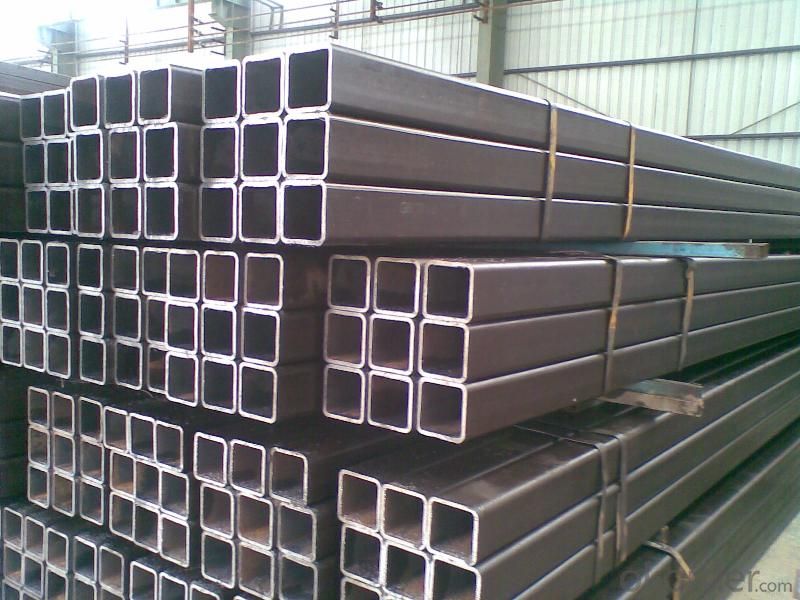
- Q: Can steel pipes be used for underground oil pipelines?
- Yes, steel pipes can be used for underground oil pipelines. Steel pipes are commonly used for this purpose due to their strength, durability, and resistance to corrosion. They are capable of withstanding the high pressure and extreme conditions associated with oil transportation underground.
- Q: What is the standard length of a steel pipe?
- The standard length of a steel pipe can vary depending on the industry and application. However, in general, the standard lengths of steel pipes range from 18 to 24 feet. These lengths are commonly used in construction, plumbing, and other industrial applications. It is important to note that custom lengths can also be obtained to suit specific project requirements.
- Q: What is the outer diameter of the steel tube?
- The outer diameter refers to the maximum diameter including the thickness of the steel tube, the inner diameter is the length of the hollow part inside, and the outer diameter minus the inside diameter is the thickness of the steel pipe
- Q: How do you calculate the flow velocity in a steel pipe?
- In order to determine the flow velocity in a steel pipe, one must take into account the principles of fluid mechanics and apply relevant equations. The Bernoulli equation is the most commonly used equation for this purpose, as it establishes a relationship between the pressure, velocity, and elevation of a fluid. The first step is to ascertain the volumetric flow rate (Q) of the fluid that passes through the pipe. This can be achieved either by measuring the mass flow rate (m) or by directly measuring the volumetric flow rate using a flow meter. Once the volumetric flow rate is obtained, the flow velocity (V) can be calculated. To calculate the flow velocity (V), divide the volumetric flow rate (Q) by the cross-sectional area (A) of the pipe. The cross-sectional area of the pipe can be determined using the formula A = πr^2, where r represents the radius of the pipe. Hence, the formula to calculate the flow velocity (V) in a steel pipe is: V = Q / A It is important to note that this calculation assumes an ideal flow condition and does not take into account any frictional losses or other factors that could impact the flow. In real-world scenarios, it is crucial to consider additional factors such as pipe roughness, fluid viscosity, and pipe diameter to obtain a more accurate estimation of the flow velocity.
- Q: Are steel pipes suitable for underground installations?
- Yes, steel pipes are suitable for underground installations. Steel pipes are known for their durability, strength, and resistance to corrosion, making them ideal for underground use. They can withstand the pressure from the surrounding soil and are able to handle heavy loads, making them a reliable choice for underground installations such as drainage systems, water supply lines, and underground utilities.
- Q: What is the difference between steel pipes and fiberglass pipes?
- The main difference between steel pipes and fiberglass pipes lies in their composition and properties. Steel pipes are made of metal and are known for their strength, durability, and resistance to high temperatures and pressure. They are commonly used in industrial settings and for transporting liquids and gases. On the other hand, fiberglass pipes are made of glass fibers embedded in a resin matrix, providing them with excellent corrosion resistance, lightweight properties, and insulation capabilities. Fiberglass pipes are often used in applications where corrosion is a concern, such as in chemical processing plants or wastewater treatment facilities.
- Q: How are steel pipes used in structural applications?
- Steel pipes are commonly used in structural applications due to their high strength and durability. They are used for various purposes such as supporting structures, transferring loads, and providing stability. Steel pipes can be used as columns, beams, or trusses in buildings, bridges, and other structures. They are also used for underground water and gas pipelines, as well as in industrial and manufacturing facilities. Overall, steel pipes play a crucial role in providing stability and strength to structural applications.
- Q: How are steel pipes classified based on their diameter?
- Various categories exist for classifying steel pipes based on their diameter. The most commonly used classification system for steel pipes is the nominal pipe size (NPS), which is a set of standard sizes in North America that designate the diameter of the pipe. The NPS is expressed in inches and represents the approximate inside diameter (ID) of the pipe. Steel pipes can be divided into three main categories based on their diameter: small bore, medium bore, and large bore. Small bore pipes have an NPS of 2 inches and below, medium bore pipes have an NPS between 2 and 24 inches, and large bore pipes have an NPS greater than 24 inches. In addition to the NPS classification, steel pipes can also be classified based on their actual outside diameter (OD). This classification is used to determine the compatibility of pipes with fittings and other components. The OD classification is typically expressed in inches or millimeters. Overall, the diameter-based classification of steel pipes provides a standardized system that facilitates the easy identification and selection of pipes for various applications. It ensures compatibility and enables the efficient installation and effective functioning of piping systems in industries such as construction, oil and gas, plumbing, and more.
- Q: How do you measure the thickness of a steel pipe?
- There are several ways to measure the thickness of a steel pipe. One common method is to use a specialized tool called a caliper or micrometer. This tool allows you to precisely measure the diameter of the pipe at various points, and by subtracting the inner diameter from the outer diameter, you can determine the thickness. Another approach is to use an ultrasonic thickness gauge, which uses sound waves to measure the thickness of the pipe. This non-destructive testing method is particularly useful for pipes that are already installed or are difficult to access. Additionally, you can also use a magnetic or eddy current thickness gauge, which relies on the principle of magnetism or electromagnetic induction to measure the thickness of the pipe.
- Q: Can steel pipes be used in the automotive industry?
- Yes, steel pipes can be used in the automotive industry. Steel pipes are commonly used in the automotive industry for various applications such as exhaust systems, fuel lines, and structural components due to their high strength, durability, and resistance to corrosion.
Send your message to us
Square And Rectangular Steel Pipe All Sizes Good Price
- Loading Port:
- Tianjin
- Payment Terms:
- TT OR LC
- Min Order Qty:
- 25 m
- Supply Capability:
- 10000 m/month
OKorder Service Pledge
OKorder Financial Service
Similar products
Hot products
Hot Searches
Related keywords
